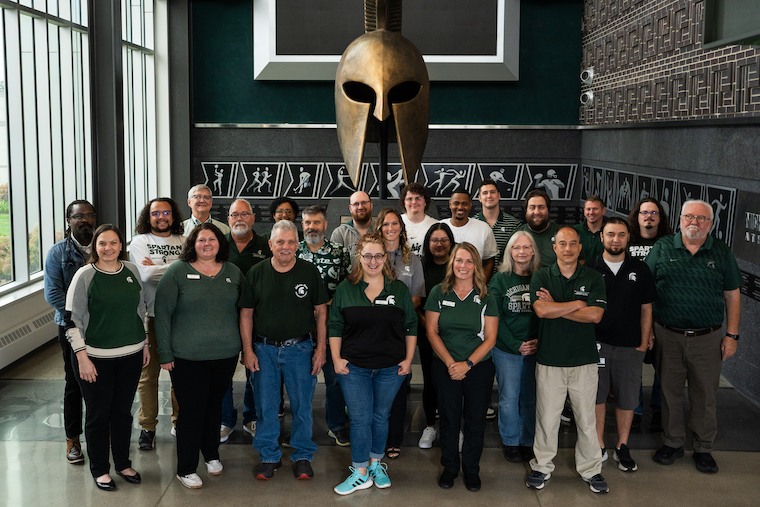Introduction to Digital Strategies and Services (DSS)

Digital Strategies and Services (DSS) partners with units across the Division of Student Life and Engagement (SLE) to determine technology needs, coordinate strategy, and implement campus, divisional, and individual solutions that align with the SLE mission.
Additionally, as an MSU IT-federated unit, DSS partners with centralized campus IT service providers to represent the needs of SLE in campus technology initiatives and shared services.
DSS Organization Chart
Help us help you!
-
Check out the self-help Knowledge Base on our website (dss.sle.msu.edu).
-
Having trouble with something? Contact the Service Desk! 517-353-1691 or Chat
-
Review this article, Who to Contact for SLE Technology Support, which provides details on who to call for what, along with resources for common topics.
-
Print off this one-page DSS Handy Info Sheet for quick reference.
-
Connect with your Strategic Integration Manager (SIM) early and often! They can help determine best practices, scope, costs, feasibility and support for larger technology efforts. (If you're not sure who your SIM is, contact the Service Desk.)
-
Submit a ticket/request through our website (dss.sle.msu.edu). Need help submitting a ticket? We have a video and guide for that.
-
Not sure where to start? Contact the Service Desk. Friendly technology specialists will get you pointed in the right direction.
Meet the DSS Team

Digital Strategies and Services (DSS) teams engage with unit operations and administer critical SLE applications and services. We advocate and advance the goals of our divisional partners through collaboration, communication and innovation in the following areas:
Access Management
4 regular team members (1 half-time) plus 2 students and 1 intern – Led by Melanie Phillips, who also leads the Service Desk
The Access Management team, also known as the ARF (Access Request Form) team, is the first point of contact for systems access. They manage and troubleshoot user access to SLE systems and shared drives, and handle requests for Outlook distribution lists, shared mailboxes and calendars.
5 regular team members – led by Denise Ngubeni, Director of DSS
A Strategic Integration Manager (SIM) is embedded in each department and acts as a liaison between that department and DSS. The SIM gains knowledge of how the department operates and works with the department to find potential technical solutions for problems and opportunities they face. They’re a first point of contact when someone has a need and doesn’t know where to go from there. SIMs also manage any technology projects and manage technology purchases and renewals.
Tech Support Team
5 regular team members plus 9-15 students – Led by Tony Nyquist
The Tech Support team supports all hardware used by SLE team members, customers, and guests. This includes installing and troubleshooting Windows and Mac hardware and software, along with more specialized devices such as POSs (points-of-sale), digital signs, and more. They maintain inventory and replace hardware as it ages or fails.
Solutions Engineering and Leadership (SEAL) Team
Consists of Application Administration Team, Web Development Team, and Business Intelligence/Reporting Team – Led by Larry Farmer
App Admin Team - part of the SEAL Team
6 regular team members – Led by Larry Farmer
The App Admin team provides technical and process support for SLE applications. They combine technical knowledge and vendor familiarity with an understanding of the business processes that drive the needs for applications. Where the SIMs provide vertical knowledge of the systems within a department, the App Admins provide horizontal knowledge of applications that can span multiple areas. Examples of major systems include: the suite of systems used at the Kellogg Center, the recipe and menu management system used by Culinary Services, and the housing system.
Web Team - part of the SEAL Team
5 regular team members plus student intern developers – Led by Justin Rappaport, Web Strategist
The Web team is all things web. Their primary responsibility is creating and maintaining all divisional websites. The creation of websites is managed through the Web Strategy project, which this team oversees. Other work includes: custom applications, supporting online retail stores and payment gateways, and supporting Engage SLE, the divisional communication intranet. They also provide accessibility/usability expertise to the division and advise on prospective technology purchases and best practices for email and online marketing.
Service Desk
3 regular team members plus 2 students – Led by Melanie Phillips, who also leads the Access Management team
The SLE Service Desk provides front-line troubleshooting and diagnostics via phone, chat, tickets and walk-up service at 1855 Place from Monday-Friday, 8 a.m.-5 p.m. They handle low-to-mid-level problems and answer questions, elevating more complex issues to other teams as needed. They also actively monitor and report issues with hardware, such as digital signs and time clocks.
Technology Training & Communication
1 team member, Melanie McNutt
The technology trainer provides in-person, virtual and video training for systems that support the operations of SLE units. They also provide guides, knowledge base articles, articles in divisional publications and email communications to keep team members informed of upcoming initiatives. The trainer also serves as a resource for other software training and connects team members with information from MSU IT.
Systems Engineering Team (SET)
5 regular team members – Led by Matthew Troncoso
The Systems Engineering Team is responsible for the critical infrastructure on which systems and services run, along with dozens of other supporting systems. Services provided by SET range from servers and database clusters through application deployment and administration. Infrastructure planning is an important role of SET, determining which solutions make the most sense fiscally and operationally. SET is engaged in many projects including upgrades to Microsoft SQL databases, web infrastructure improvements and many more.
Transaction Management Team
3 regular team members – Led by John Henrikson
The Transaction Management Team’s main responsibility is the cardholder system, Transact. Transact holds all cardholder data, meal plans, Spartan Cash debit balances, and other access privileges. Dining and retail locations use registers that run on our Transact Cloud POS system. They manage all access to these systems as well.